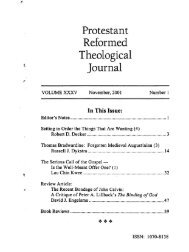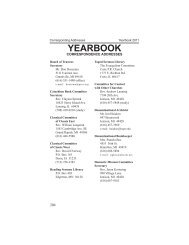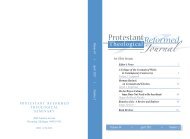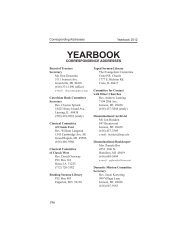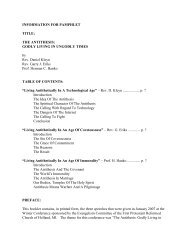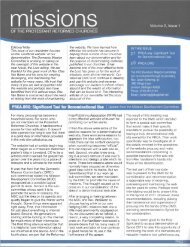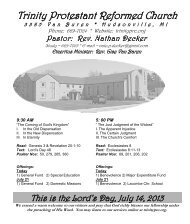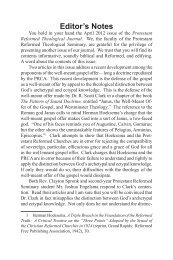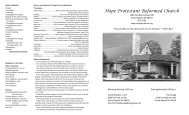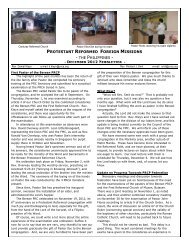November 2007 - Protestant Reformed Churches in America
November 2007 - Protestant Reformed Churches in America
November 2007 - Protestant Reformed Churches in America
Create successful ePaper yourself
Turn your PDF publications into a flip-book with our unique Google optimized e-Paper software.
<strong>Protestant</strong> <strong>Reformed</strong> Theological Journal<br />
reprobate are the recipients of such common works of the Spirit,<br />
which do not necessarily issue <strong>in</strong> salvation, the implication is that<br />
man has a role to play. He must be careful not to suppress such<br />
works <strong>in</strong> him. An unregenerate man has a fully function<strong>in</strong>g will,<br />
but his will has been corrupted. Therefore Perk<strong>in</strong>s <strong>in</strong>sisted that<br />
regeneration affects the goodness of man’s will, not the faculty of<br />
will<strong>in</strong>g itself:<br />
Regeneration does not change the operations of the human faculties<br />
themselves, but only ‘the goodness thereof,’ because the former rema<strong>in</strong>s<br />
unaltered while the latter was lost <strong>in</strong> the Fall. Insofar as the<br />
human faculties are concerned, therefore, one may speak of preparation<br />
for conversion … <strong>in</strong>sofar as the goodness of the will is concerned,<br />
however … the s<strong>in</strong>ner may never prepare himself for conversion<br />
as the will itself is <strong>in</strong> need of be<strong>in</strong>g ‘born aga<strong>in</strong>.’ 5<br />
Aga<strong>in</strong> to the question, ‘whether the natural corrupted will can <strong>in</strong> any<br />
way prepare and dispose itself to his own conversion and justification,’<br />
Perk<strong>in</strong>s replies: ‘…But the certa<strong>in</strong> truth is, that the will cannot.’<br />
6<br />
Perk<strong>in</strong>s dist<strong>in</strong>guished between different preparatory works. He<br />
did this by subdivid<strong>in</strong>g such operations <strong>in</strong>to the “beg<strong>in</strong>n<strong>in</strong>gs of<br />
preparation” and the “beg<strong>in</strong>n<strong>in</strong>gs of compunction.” The former<br />
he called “the m<strong>in</strong>istry of the law.” These beg<strong>in</strong>n<strong>in</strong>gs of preparation,<br />
accord<strong>in</strong>g to Perk<strong>in</strong>s, are not gracious. They are common<br />
operations of the Spirit, which give no <strong>in</strong>dication of whether God<br />
<strong>in</strong>tends to save the s<strong>in</strong>ner or not. Pangs of conscience, fear of<br />
punishment, horror over one’s s<strong>in</strong>s, and deep conviction could be<br />
merely foretastes of hell, not evidence of the grace of God work<strong>in</strong>g<br />
with<strong>in</strong> the heart. On the other hand, the beg<strong>in</strong>n<strong>in</strong>gs of compunction<br />
are gracious and lead to true conversion. The reprobate<br />
partake of the former, but only the elect of the latter works. This<br />
dichotomy “served not only to safeguard div<strong>in</strong>e monergism <strong>in</strong> sal-<br />
5. Song, Theology, p. 133.<br />
6. Song, Theology, p. 134.<br />
60<br />
Vol. 41, No. 1



